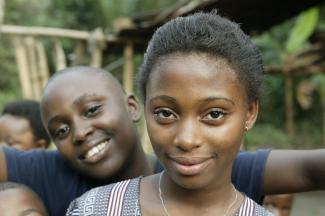Cameroon
Offering opportunities

How would you describe the situation of Cameroon’s youth?
The rural population is very young. Eighty percent of the people are between 16 and 25 years old. Many adolescents have a hard time finding a job and fulfilment. The state offers virtually no solutions to their social and economical problems, so they are frustrated and alienated, which is quite alarming. The majority have turned their backs on politicians who do not help them. Many find comfort in alcohol or become delinquent. Others leave the country to seek their fortune in the neighbouring Equatorial-Guinea and Gabon or in Europe – and more often than not they do so without valid papers.
What are the main problems?
The lack of jobs is the worst thing. The statistics are not completely reliable, but more than five percent of Cameroon’s youth are unemployed and more than 70 % are underemployed. Whether they are well educated or not, makes no difference. Thousands are looking for a job, but cannot find one. That is why many take up all sorts of mini jobs.
Why is an education of no use?
Many young people with university degrees in social sciences, law or literature are unemployed. Accordingly, some people do not believe in education anymore. On the other hand, many adolescents value football, for instance, because this sport seems to offer opportunities to make money fast. Too often, curricula are not aligned with what the job market demands. The system for vocational training has not been developed, and it hardly receives state support. Society undervalues skills training in comparison with a university education. The costs of any professional or vocational training are high, and typically the parents must cover them. Most families in Cameroon tend to hope that their children will get a high position in the public administration rather than believing in investing in vocational training.
What do parents do in their children’s support?
Unfortunately, parents often neglect their responsibility as primary educators. Most parents are busy earning money. In the daily grind, they do not have time to pay much attention to their children. Parents, moreover, fail to discuss many things that are social taboos with their children. Many girls become pregnant, for instance, because nobody educates adolescents about sexuality and contraceptives.
Does that mean that teenagers do as they please?
No, they don’t. Social monitoring through the family remains quite strict. Many adolescents, moreover, completely depend on their parents and relatives. At the same time, there are no positive role models in society. Many youngsters live in great uncertainty about their future. They are torn between tradition and modernity and are trapped in identity crises. As a consequence, many embrace the wrong values such as crime and corruption.
As in many traditional societies, youngsters have little say in Cameroon.
Yes, our youth is not really involved in politics, even if they are interested. One reason is gerontocratic hierarchies. The heads of political parties and the top officials in government are quite old, and they hardly involve young people in decision making. Those youngsters who do join political parties normally get manipulated by the party leaders. On the other hand, some manage to get a good job thanks to such connections.
Does the state not try to contain youth unemployment?
Yes, the government did initiate a programme, which is supposed to recruit 25,000 young people into public agencies – the police, the army, public administration and schools. There are also different initiatives, which are meant to better integrate adolescents into the job market after they finish school. They offer small projects, for instance the “projet intégré d’appui aux acteurs du secteur informel” (PIAASI – integrated project to support protagonists in the informal sector).
Why is that not enough?
It is not enough, because unemployment is very high. Many young people have left their villages for the city in search of better opportunities. Sometimes the jobs on offer, however, are very specific, and the adolescents’ qualifications don’t match the demands.
What do you do to support the young generation?
First, DUCA offers adolescents practically relevant basic training in computer programmes, tailoring, gastronomy and housekeeping. In addition, we offer courses in personality development, child-rearing, living in a relationship, preventing conflict and violence, or taking care of health issues and contraception. We offer career counselling and help our clients to start small businesses. We encourage discussion on diverse topics. The basic training that DUCA offers is supposed to promote self-confidence, awareness and personal initiative, and not merely teach practical and technical skills. After two months of training, DUCA provides and funds multi-year vocational training of the adolescents’ choice. They learn their trade in various small enterprises. After that apprenticeship, DUCA continues to accompany them. Once their vocational training is finished, we help them to find a livelihood.
What kind of jobs do they find?
We generally hope that an apprentice will be employed by the company after his or her training is completed, which is what we advocate. If that is impossible, DUCA tries to find an internship at another company. In many professions, such as tailoring or hairdressing, people can start their own businesses. We support them throughout the process. Yet, we also expect them to stay in touch with the company where they were trained. In the current economic context, this remains a big challenge for us.
Do young people still need DUCA after their training?
To be sure, we keep an eye on them. We are a counselling and information centre for young people who are confronted with all sorts of problems. The organisation offers room for sharing experience and discussing tough topics like corruption, prostitution, family relationships and many more things. Some young people stay in touch with us, but many only come when they have problems.
Florentine Fandio is a supervisor at DUCA (Donner une chance à l’avenir – giving the future a chance).
nekdemfandio@yahoo.fr







